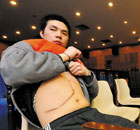News Flash
Huge rally and protests mark Iran revolution
(Agencies)
Updated: 2010-02-12 04:00
 |
Large Medium Small |
State buses ferried many to the square. State media touted the turnout as a show of support for the government -- though to an extent, celebrations for the revolution cross partisan lines, and many Iranians who oppose Ahmadinejad but support the clerical leadership turn out annually. Among those attending was influential former president Akbar Hashemi Rafsanjani, an opposition supporter.
In his nationally televised address in the square, Ahmadinejad proclaimed that Iran has produced its first batch of uranium enriched to a higher level, 20 percent -- and boasted that Iranian scientists are capable of going even further, to 80 percent. "But we don't ... because we don't need it," he said.
He repeated Iran's stance that it is not building a nuclear weapon and does not intend to do so, adding, "If we wanted to manufacture a bomb, we would announce it."
Iran's move to further enriched uranium, from around 3 percent purity to 20 percent, has drawn sharp criticism from the United States and its allies, which accuse Tehran of seeking to develop a nuclear bomb. Uranium enriched to 90 percent can be used to build a warhead.
Ahmadinejad made no mention in his speech of Iran's political turmoil.
For days ahead of the anniversary celebrations, anti-government Web sites and blogs have called for a major turnout in counter protests. Groups of opposition protesters gathered Thursday in several locations around Tehran, wearing green clothes and waving green balloons, the opposition's signature color.
Security forces fired tear gas to disperse a group of protesters who were trying to march toward Azadi Square as they chanted "death to the dictator," the opposition Web site Kaleme said, reporting an unknown number of arrests. Police and Basijis on motorbikes swept toward central Tehran, where protesters and security forces clashed in several locations, it reported.
The heaviest violence appeared to be in Sadeqieh Square, about a half-mile (one kilometer) from the anniversary rally, where riot police fired paint-filled balls at hundreds of protesters chanting opposition slogans, witnesses said. The witnesses spoke on condition of anonymity for fear of retribution from authorities.
The assault on Mousavi's wife took place in the square, and government supporters also blocked Mousavi himself from joining the protests, his Web site said.
Hard-liners also attacked the convoy of another senior opposition leader, Mahdi Karroubi, as he headed to the square, his son Hossein Karroubi told The Associated Press. The attackers smashed the windows of his car, forcing him to turn back from joining the protests, he said.
Security forces also briefly detained Khomeini's granddaughter and her husband, who are both senior pro-reform politicians, according to the couple's son, Ali.
The granddaughter, Zahra Eshraghi, and her husband Mohammad Reza Khatami, who is the brother of a former pro-reform president, were held for less than an hour before being released, their son told the AP.
The opposition claims that Ahmadinejad's victory in the June 12 election was fraudulent and that the true winner was pro-reform leader Mir Hossein Mousavi. Hundreds of thousands marched in the streets against the government in the weeks after the vote, prompting a massive wave of arrests.
Nevertheless, the opposition has succeeded in continuing to hold regular protests, often timing them to coincide with days of important political or religious significance in attempts to embarrass authorities. The tone of the rallies has shifted from outrage over Ahmadinejad's re-election to wider calls against the entire Islamic system, including Khamenei.
Tensions have mounted further since the last large-scale marches, in late December, which brought the most violent battles with security riots in months. At least eight people were killed in clashes between protesters and police, and security forces have intensified arrests in the weeks since.
In January, two people who were put on trial alongside opposition politicians and protesters were executed for allegedly plotting to overthrow the state. Authorities have announced that 10 other opposition supporters have also been sentenced to death, a move many believe was aimed at intimidating protesters.











